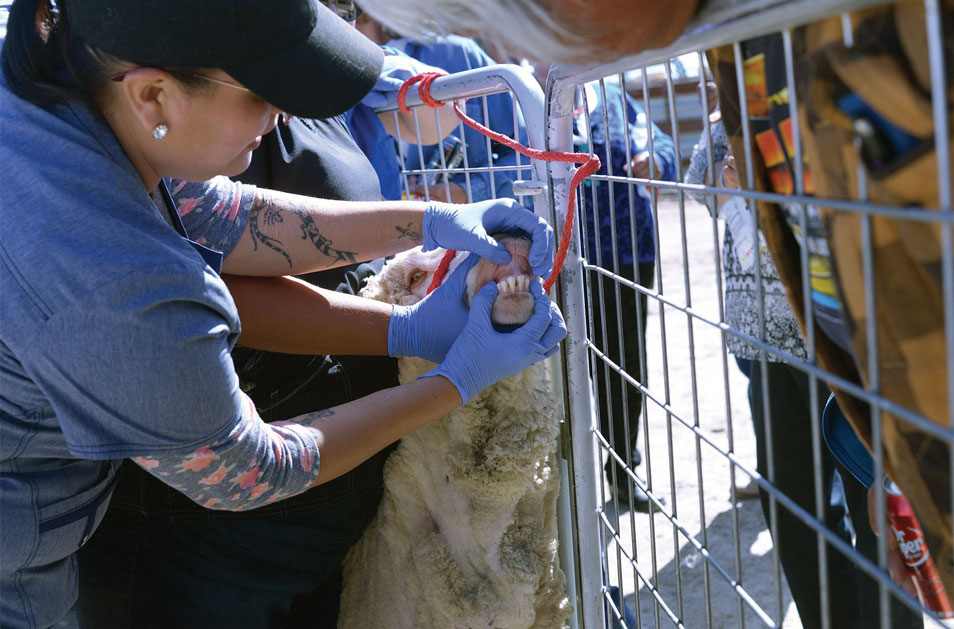Many career options are available with a degree in Animal Science. Through experiential learning, the Animal Science program will provide a high quality educational experience. For the most part, students will complete general education courses during their first two years at NTU to prepare for more specialized courses in their third and fourth years. Knowledge in these specialized subjects lays the framework for entry into a broad range of professions in Native American communities, as well as throughout the United States and also to pursue advanced professional degrees, such as a D.V.M. (Doctor of Veterinary Medicine), medical school, pharmacy school, physical therapy, dental school, etc.
A student needs to complete the core Animal Science and general education courses within the first two years of study with a grade point average of 2.00 or better before taking the upper level core courses (300 and 400-level courses). To complete the program, a credit load of 13-15 per semester along with summer sessions are mandatory.
Bachelor of Science Degree – Animal Science (122 Credits)
| Semester ONE | Credits | Prerequisites | |
|---|---|---|---|
| ENGL 1110 | Composition I | 3 | ENG 098 or satisfactory placement scores |
| BIOL 2110C | Principles of Biology: Cellular & Molecular Biology | 4 | |
| MATH 1220 | College Algebra | 4 | MATH 1215 or satisfactory placement of scores |
| BCIS 1115 | Introduction to Computers/Elective | 3 | |
| Semester TWO | |||
| ENGL 1120 | Composition II | 3 | ENGL 1210 or 1110 |
| ASC 100 | Introduction to Animal Science | 3 | |
| COMM 1130 | Public Speaking | 3 | ENGL 1210 or 1110 |
| BIOL 2120C | Cellular & Molecular Biology | 4 | |
| Semester THREE | |||
| ECON 1110 | Survey Economics | 3 | |
| ASC 200 | Animal Science Practicum with Lab | 2 | ASC 100 |
| ASC 210 | Animal Science Career Development | 1 | ASC 100 |
| CHEM 1217C | Principles of Chemistry I | 4 | MATH 1220, CHEM 1120C |
| BIOL 2310 | Microbiology | 4 | BIOL 2110C or 2120 |
| Semester FOUR | |||
| CHEM 1225C | General Chemistry II for STEM Majors | 4 | CHEM 1217C |
| ASC 220 | Comparative Anatomy of Animals with Lab | 3 | ASC 100, BIOL 2110C, CHEM 1217C |
| ASC 230 | Comparative Physiology Domestic Animals with Lab | 3 | ASC 100, BIOL 2110C, CHEM 1217C Corequisite - ASC 220 |
| Humanities & Behavioral/Social Science Course | 3 | ||
| Semester FIVE | |||
| BIOL 226 | Principles of Genetics | 4 | BIOL 2110C or 2120 |
| PHYS 1230C | Algebra-Based Physics I | 4 | |
| ASC 320 | Animal Nutrition and Metabolism | 3 | ASC 200, ASC 210, MATH 1220 |
| ASC 340 | Animal Reproduction and Lactation | 3 | ASC 220, ASC 230 |
| Semester SIX | |||
| Diné Studies Course | 3 | ||
| ASC 330 | Feeds and Feeding with Lab | 3 | ASC 220, ASC 230, ASC 320, MATH 1220 |
| Humanities/Social Science Course | 3 | ||
| ASC 400 | Sheep and Goat Production and Management with Lab | 4 | ASC 340, ASC 320, ASC 220, ASC 230; corequisite ASC 330 |
| Summer Semester | |||
| ASC 420 | Dairy Production Management with Lab | 4 | ASC 340, ASC 330, ASC 320, ASC 230, ASC 220 |
| ASC 440 | Swine Production and Management | 4 | ASC 340, ASC 330, ASC 320, ASC 220, ASC 230 |
| Semester SEVEN | |||
| ACG 210 or ACG 212 | Introduction to Financial Principles of Management or Introduction to Finance | 3 | |
| BIOL 302 | Cell Biology with Lab | 4 | BIOL 2110C or 2120C |
| ASC 460 | Beef Production and Management with Lab | 4 | ASC 340, ASC 330, ASC 320, ASC 220, ASC 230 |
| CHEM 2130C | Organic Chemistry I | 4 | CHEM 1225C |
| Semester EIGHT | |||
| MATH 1350 | Introduction to Statistics | 3 | |
| BIOL 2130C | Introduction to Biochemistry | 4 | BIOL 302 |
| ENV 365 | Natural Resources Management with Lab | 4 | |
| ASC 480 | Horse Production and Management with Lab | 4 | ASC 340, ASC 330, ASC 320, ASC 220, ASC 230 |
| Summer Semester | |||
| ASC 498 | Internship in Animal Science | 3 | ASC 480, ASC 460, ASC 440, ASC 420, ASC 400 |
| Total Required Credits | 122 | ||

